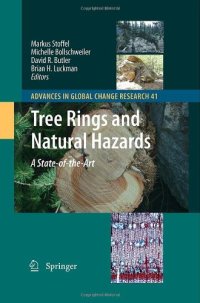
Ebook: Tree Rings and Natural Hazards: A State-of-Art
- Genre: Science (General)
- Tags: Natural Hazards, Geomorphology, Physical Geography, Forestry, Climate Change
- Series: Advances in Global Change Research 41
- Year: 2010
- Publisher: Springer Netherlands
- Edition: 1
- Language: English
- pdf
The initial employment of tree rings in natural hazard studies was simply as a dating tool and rarely exploited other environmental information and records of damage contained within the tree. However, these unique, annually resolved, tree-ring records preserve valuable archives of past earth-surface processes on timescales of decades to centuries. As many of these processes are significant natural hazards, understanding their distribution, timing and controls provides valuable information that can assist in the prediction, mitigation and defence against these hazards and their effects on society.
Tree Rings and Natural Hazards provides many illustrations of these themes, demonstrating the application of tree rings to studies of snow avalanches, rockfalls, landslides, floods, earthquakes, wildfires and several other processes. Several of the chapters are "classic studies", others represent recent applications using previously unpublished material. They illustrate the breadth and diverse applications of contemporary dendrogeomorphology and underline the growing potential to expand such studies, possibly leading to the establishment of a range of techniques and approaches that may become standard practice in the analysis of natural hazards in the future.
The initial employment of tree rings in natural hazard studies was simply as a dating tool and rarely exploited other environmental information and records of damage contained within the tree. However, these unique, annually resolved, tree-ring records preserve valuable archives of past earth-surface processes on timescales of decades to centuries. As many of these processes are significant natural hazards, understanding their distribution, timing and controls provides valuable information that can assist in the prediction, mitigation and defence against these hazards and their effects on society. Tree Rings and Natural Hazards provides many illustrations of these themes, demonstrating the application of tree rings to studies of snow avalanches, rockfalls, landslides, floods, earthquakes, wildfires and several other processes. Several of the chapters are "classic studies", others represent recent applications using previously unpublished material. They illustrate the breadth and diverse applications of contemporary dendrogeomorphology and underline the growing potential to expand such studies, possibly leading to the establishment of a range of techniques and approaches that may become standard practice in the analysis of natural hazards in the future.